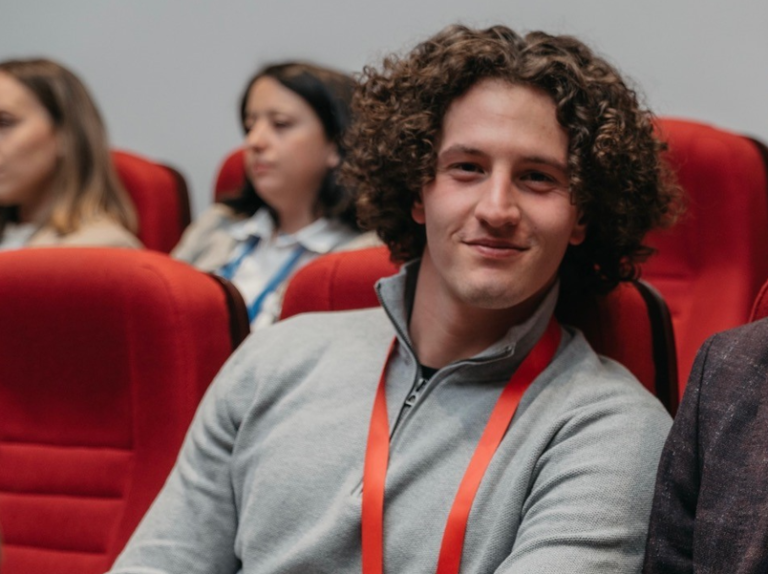Ahmed Aizi is a medical student at UMF, Cluj-Napoca, where he is involved in the medical student organization, and he is a co-chair of the student council at NeurotechEU. He also founded the tech startup “AIDE” helping medical students study basic sciences.

I love coordinating and connecting with people from distant places, organizing and thinking about how we can implement solutions in a feasible way for everyone.
Ahmed Aizi
How did you join NeurotechEU?
I heard about it from Dr. Asha, a colleague at the student council. The chance to travel to different places, learn new things, and create new connections and partnerships was what attracted me.
Has your involvement changed your future career goals?
Absolutely. I was very clinically focused with a planned residency and research path. NeurotechEU has turned me towards a more managerial track. I love coordinating and connecting with people from distant places, organizing and thinking about how we can implement solutions in a feasible way for everyone.
How is Neurotech EU different from your previous experiences?
My parents are Algerian and German, and we moved around a lot. I grew up in Germany, the US, and the Emirates. But NeurotechEU has provided a focused goal to work on collectively. We gather insights from various cultures to implement better solutions for European society, not just ourselves. It’s about drawing on diverse experiences to create a more effective project.
How does your international background help your involvement in NeurotechEU?
I can connect and exchange ideas very quickly with people from different places. It made me open to accepting other’s opinions, incorporating them into my own, and creating a more fluid solution. Exposure to various cultures inspires a desire for even more exposure to broaden one’s understanding. You can learn and see more in this sense. That’s a tremendous help.
How does your startup connect to NeurotechEU?
AIDE focuses on personalized learning solutions. We offer multimodal learning, video, audio, bionic reading, and spaced repetition to help users learn efficiently. It’s like having a virtual professor.
We use neural networks and AI to understand how people learn best and to create the most natural and human-feeling flow possible. The name AIDE is an acronym for AI-Driven Education. And it’s also an aid. With the help of it, users can learn more efficiently. And we use all of this around a centralized university curriculum. We’re working with the universities to implement their curriculum and tailor the learning flow to each user. It aligns with Neurotech’s goal of advancing education through technology.
Who is your target group for AIDE?
Currently, our target group is medical students, given our academic connections within NeurotechEU. However, we plan to expand to university students in other fields, high schoolers interested in medicine, and even elementary school students. We aim to revolutionize education by providing a more engaging and personalized learning experience.
How did you come up with this idea?
My dissatisfaction with traditional learning methods was a significant driving force. I wanted to create a more engaging and personalized learning experience, reflecting my frustration with dull textbooks. I want to help other students to have a more engaging learning experience where they feel they’re seen and don’t need to regurgitate text.
Can you share how AIDE evolved from its initial idea to where it is now?
Initially, it was just an idea, and I needed to figure out how to implement it. Then, I met a talented software engineer who joined me, and we formed a team together. Within two months, we received positive feedback validation and even secured a place in an innovation accelerator in Romania. We’re grateful for the support and connections that have helped us progress rapidly.
Did you get any help from your professors or stakeholders connecting to NeurotechEU?
We’re in very early discussions about implementing our solution within NeurotechEU for medical students. We’re also exploring collaborations with UMF and local companies to enhance our project’s reach and impact.
Is there anything else you want to add about your journey or AIDE?
I want to emphasize the importance of being open-minded and collaborative. I didn’t start my medical journey with a strong entrepreneurial mindset. It developed naturally through listening to people, making connections within NeurotechEU, and being receptive to various insights and feedback. The power of collaboration and a Pan-European mindset of being open to new ideas and embracing diverse perspectives cannot be underestimated.
What are your long-term goals for AIDE?
My long-term goals for AIDE are open-ended. I want to continue my medical studies and pursue a business degree while growing the startup. We aim to expand our reach to universities and students worldwide, focusing on enhancing the learning experience for everyone.
We plan to expand to other fields of study and we also want to help people with special needs, educating those with mental and cognitive disabilities who lack adequate educational support.
There are so many different ways where you can help teach people things. Education has been delivered in a lecture-based model for a while. You’re sitting in a classroom, someone teaches you something, you write things down, and that’s it. But now we can do more than that. And it’s time to do more than that. There’s a growing demand for innovative educational technology, and we want to be at the forefront of delivering it.
By: Krisztina Csiba, University of Debrecen